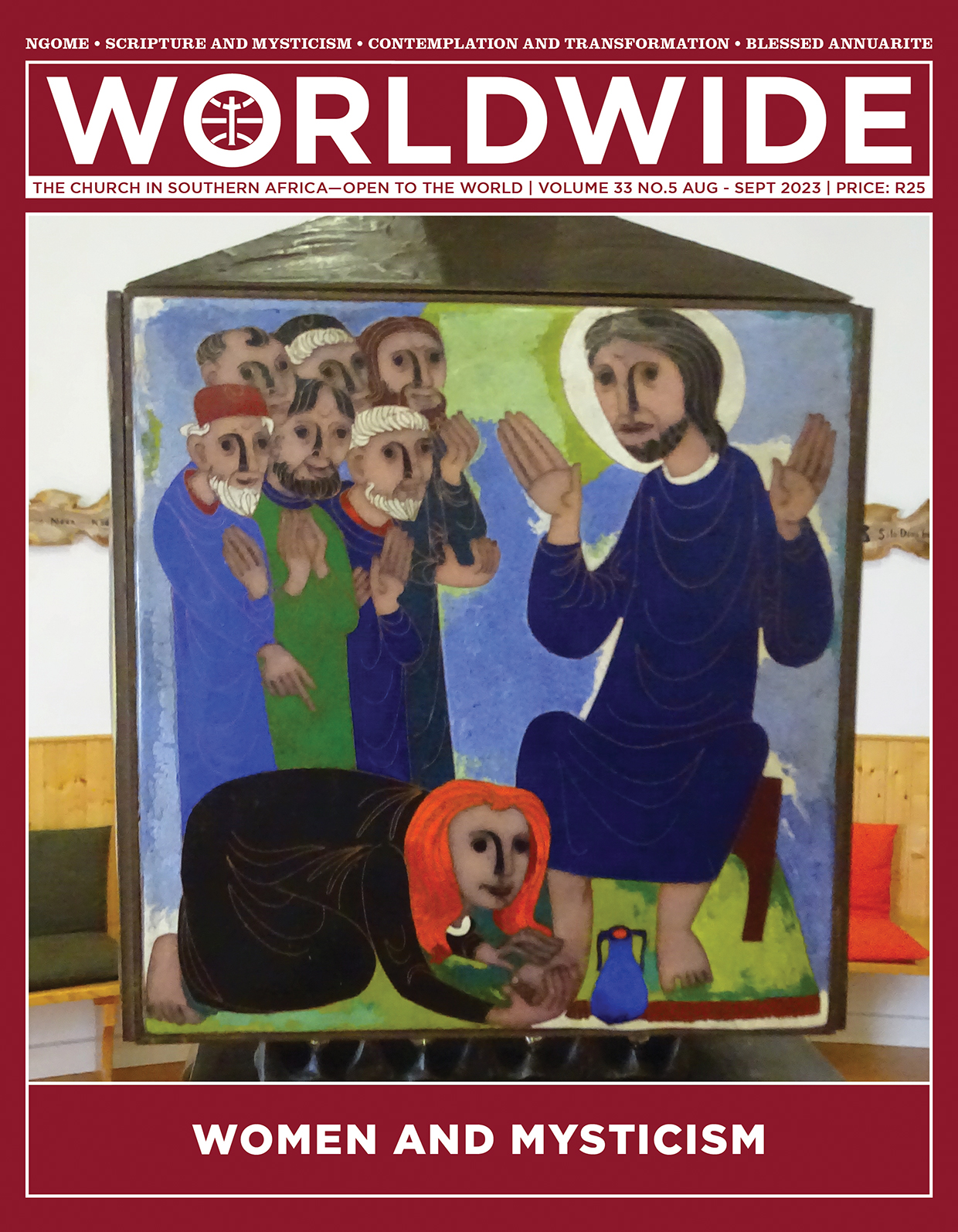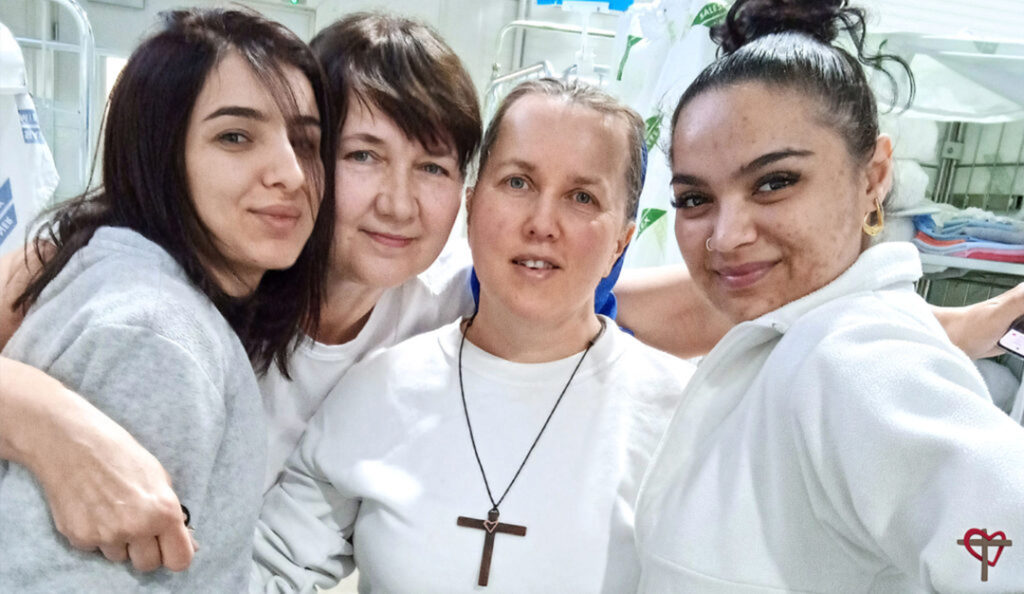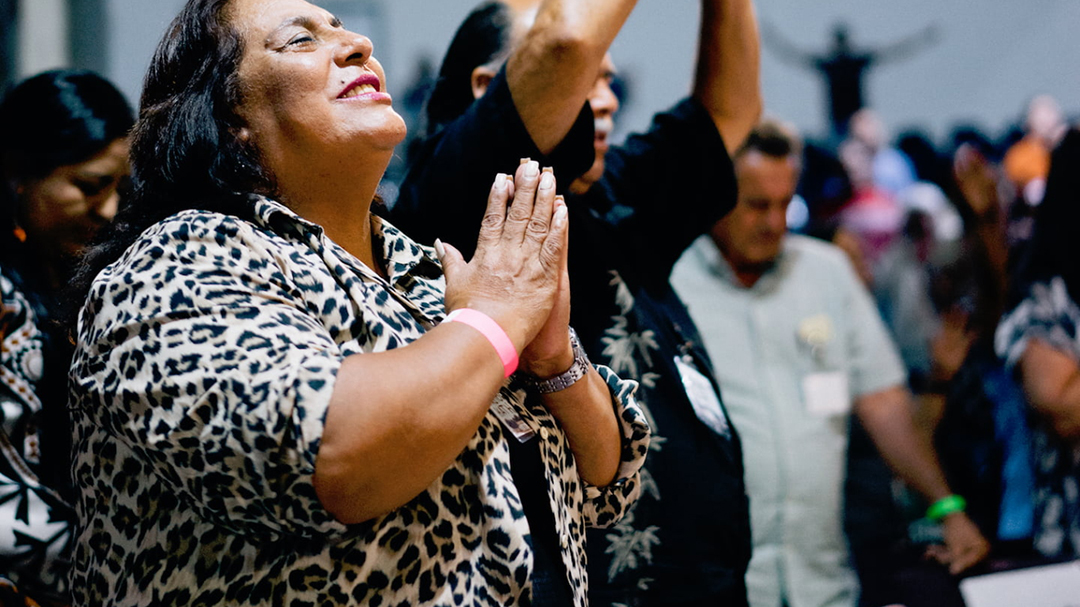
WOMEN AND MYSTICISM
Mary anoints Jesus’ feet at Bethany (John 12:1–8). The scene is part of a series which represents passages of women with a prominent role in the Scripture. The decorations are placed around the sides of the Tabernacle in the Chapel of Meditation at the University of Mystics in Avila, Spain.
Mary listens to and manifests her love for Jesus. Contemplation becomes the mesh in which her Spirit-led actions find their meaning and support.
RADAR

Candies against fear
The Little Sisters of Jesus live their contemplative and active lives in fraternity. They work among those marginalised: immigrants, precarious workers and township dwellers. They try to find beauty and greatness where only degradation and misery are imagined. Sr Anna offers her witness as a worker in a laundry in Slovakia
BY Sr Anna-Jana, LSJ | Bratislava, Slovakia
I HAVE been working in an Austrian industrial laundry here in Bratislava (Slovakia) with about 120 employees for two years. It’s a very modern laundry and a lot of the work involves using different machines. I am at the section for hand folding of bathrobes, sheets, hospital gowns etc. so that they are ready to be sent to hotels and hospitals.
For each workstation, there is a screen that shows the productivity of each worker as a percentage. Alongside, tables present the parameters, i.e., the number of towels, pillowcases and sheets which, must be hung or introduced into the machine per hour. Unfortunately, these figures do not take into account breaks due to machinery breakdowns or other unforeseen situations. Initially, to be a good worker and not lose this job, I wanted to meet the required parameters. But at the same time, I also wanted to be in contact with my colleagues, which was difficult for me since, as a Polish foreigner, my Slovak has a different accent. Furthermore, the work takes place very quickly and there is not much time for discussions. Nevertheless, a situation developed that showed me what was really important. One day I realised that I was the only one who hadn’t finished the job and that, to do so, I would have had to stay well after the scheduled time. I didn’t want to ask for help, I wished the others could finish their day. All the Roma women I work with, seeing that I wasn’t going out, came to help me finish. They showed me that it is possible to find joy in one’s work, not only by respecting an often-exaggerated parameter but above all in relationships and just by working together.
The simplicity of the encounter between one person and another, without prejudices, reticence, fears, etc., becomes the basis of a true encounter
About forty prisoners also work with us: they are guarded by four guards and controlled by surveillance cameras. In the beginning, the employer set strict limits on the possibility of having contact with them, so much so that we were forbidden any kind of conversation. However, after a few weeks, it became evident that it was not possible to work together like this and we were able to exchange a few words. One day early in the morning, Luca, one of the prisoners, asked me to approach him because he wanted to tell me something important. He began by telling me that he had read an illustrated Bible that someone had lent him. He was fascinated by Jesus’ encounter with the adulteress. He was particularly impressed not only by Jesus’ non-judgmental attitude towards the woman but also by the fact that he did not resort to violence against people who wanted to stone her. Luca’s need not to be judged and not to use violence against the other made me aware, once again, of the importance of looking at the other. Too often, in our haste we can only look at the other through his defects, his limitations, failing to see you, above all a person.
Following the war, some Ukrainian women welcomed by Slovakia also arrived. Some of us have started to worry. Would there be enough work for everyone? And would there be a reduction in seats? Fears and hostility arose, generated by resentment towards new hires. I wanted to get to know the Ukrainian women, but it wasn’t easy because they worked together in a separate group and only spoke their language.
One day last summer, we were all tired from the high temperature in the laundry room. We didn’t have the strength to work, we were suffocating. In those moments candies are useful. We started exchanging them: they had Ukrainian sweets and we had Slovak sweets. Small simple gestures matter, like giving candy or a smile. Jesus’ normal encounter with the Samaritan woman is equally marked by simplicity because it begins with the Lord Jesus’ simplest question: “Give me a drink” (Jn 4:7). The simplicity of the encounter between one person and another, without prejudices, reticence, fears, etc., becomes the basis of a true encounter.




